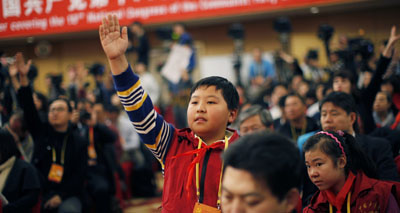When a nation’s most outspoken journalists are 11-year-olds, is it a good sign for the future? On the one hand, they might grow up to ask probing questions. On the other hand, they might end up following the path taken by their older peers and stick to scripted exchanges.
The issue comes courtesy of the 18th Party Congress ongoing in China, a five-yearly stage-managed event to determine the Communist Party’s top leaders. It is notorious for its secrecy. Two kids from the Beijing-based Chinese Teenagers News took center stage at the event on Tuesday when they bucked tradition to ask officials questions they’d thought up themselves. Zhang Jiahe and Sun Luyuan raised questions of rising housing costs and food safety respectively, according to Agence France-Presse.
A flood of coverage of their efforts followed in China, even though the answers they received were far from revealing, AFP said. The heightened interest about this relatively minor interlude speaks volumes about how hard it is to ask straightforward questions at a political event in China, and, more broadly, the difficulty of reporting on a huge occasion that seems determined not to be newsworthy. While the previous 2007 Congress saw some opening up in line with the Party’s strategy to attract international reporters to the 2008 Olympics, many politicians have shunned the limelight this year, according to Reuters.
The most dramatic revelations of the week are expected Thursday, when the next generation of Politburo Standing Committee leaders will be announced in a manner that pre-dates contemporary norms for government-media relations by several decades. Expect no speeches, or even press releases: Journalists will be left to interpret the new pecking order according to the sequence in which the officials appear on stage, news reports say.
There’s nothing here to suggest that new leaders will transform the way the Party operates overnight. But there is one possible change that could signal media reform: While the Standing Committee has been made up of nine members for years, it might be reduced this week to seven, according to local and international media reports. The change is significant, Cheng Li of the Brookings Institute told the Wall Street Journal‘s China Real Time blog, because “the two positions they are considering eliminating are the leaders in charge of propaganda and police. Over the course of five or maybe even 10 years, these two leaders really blocked a lot of economic liberalization policy and political reform initiatives. … Eliminating these two positions sends a direct signal that political reform is under way.”
Edging the propaganda chief further from the center of power is not the same as dismantling the extensive machinery of information control CPJ has documented in China. But if it happens on Thursday, it could be a sign that today’s pre-teen journalists will be able to continue asking real questions of their leaders in the future.
